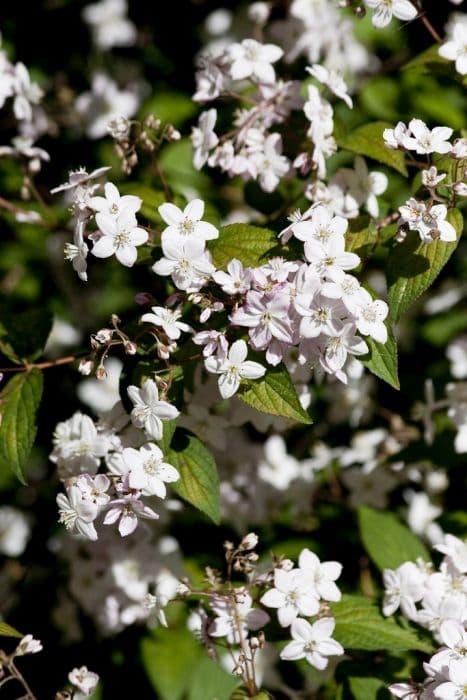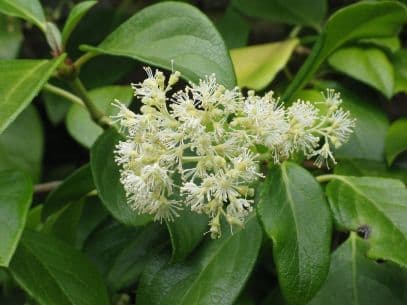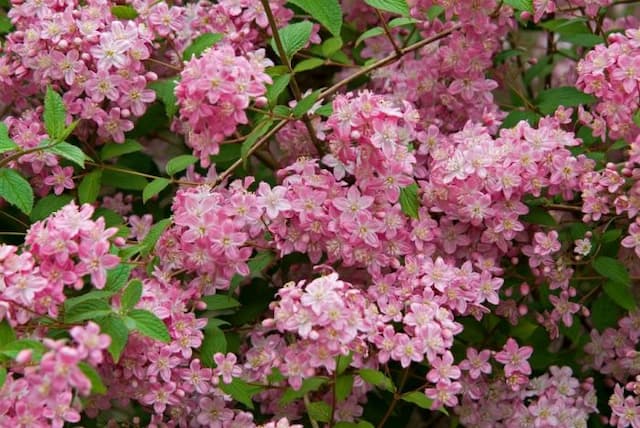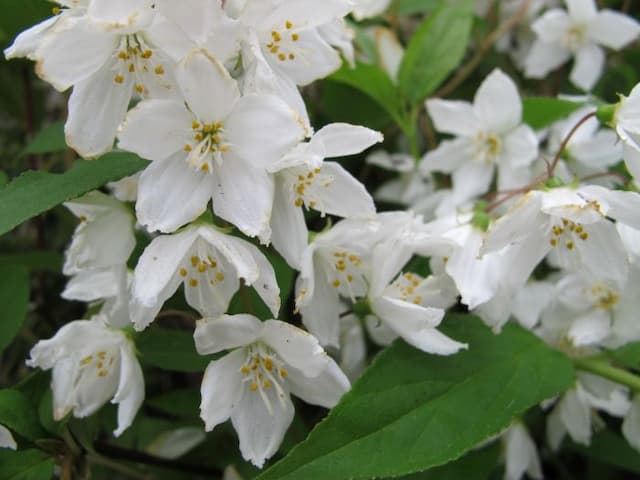Hybrid Deutzia Deutzia × hybrida 'Contraste'

ABOUT
Deutzia 'Contraste', also known as Slender Deutzia, is a deciduous shrub admired for its striking appearance. This cultivar showcases a bushy growth habit, often dense with numerous branches. It earns its name 'Contraste' from the sharp visual distinction it presents throughout the year. In spring, its branches become adorned with an abundance of flowers. These blossoms are typically star-shaped, arranged in attractive clusters of pink and white hues that provide a delightful contrast against the green foliage. As the flowering season progresses, the petals might change color, adding to the visual interest of the plant. The leaves of this plant are simple and lanceolate, displaying a bright green color during the growing season before turning to shades of purple and red in the fall, adding yet another layer of contrast to its overall display. The leaves usually have finely serrated margins, which complement the delicate texture of the flowers. Though this plant's size has been excluded from the description, its appearance throughout the seasons is characterized by this dynamic change in color and form, creating a picturesque addition to any garden space throughout the year.
About this plant
 Names
NamesFamily
Hydrangeaceae.
Synonyms
Hybrid Deutzia, Slender Deutzia, Elegant Deutzia, Pride-of-Rochester.
Common names
Deutzia × hybrida 'Contraste'.
 Toxicity
ToxicityTo humans
Deutzia 'Contraste' is not known to be toxic to humans. There are no common symptoms of poisoning associated with this plant because it is generally considered non-poisonous. Therefore, ingesting parts of this plant is unlikely to produce any toxic consequences.
To pets
Deutzia 'Contraste' is also not known to be toxic to pets. Similar to its effects on humans, this plant does not contain substances that are known to be harmful to animals, so ingestion by pets should not result in poisoning or other adverse health effects.
 Characteristics
CharacteristicsLife cycle
Perennials
Foliage type
Deciduous
Color of leaves
Green
Flower color
Pink
Height
4-5 feet (1.2-1.5 meters)
Spread
4-5 feet (1.2-1.5 meters)
Plant type
Shrub
Hardiness zones
5
Native area
Asia
Benefits
 General Benefits
General Benefits- Attractive Flowers: Deutzia × hybrida 'Contraste' blooms with showy flowers that can add aesthetic value to gardens and landscapes.
- Easy Maintenance: It is generally easy to care for and does not require frequent maintenance, making it suitable for gardeners of all skill levels.
- Seasonal Interest: This plant has seasonal appeal with its spring blooms and autumn leaf color change, offering year-round interest in the garden.
- Drought Tolerance: Once established, it can tolerate periods of drought, reducing the need for regular watering.
- Pest Resistance: The plant is relatively resistant to common garden pests, minimizing the need for chemical treatments.
- Compatibility with Wildlife: Deutzia × hybrida 'Contraste' can attract pollinators such as bees and butterflies, supporting local ecosystems.
- Versatility in Landscaping: It can be used in various landscaping designs, including borders, hedges, and foundation plantings.
- Cold Hardy: It is capable of withstanding cooler temperatures and is suitable for growing in a range of climates.
 Medical Properties
Medical PropertiesThis plant is not used for medical purposes.
 Air-purifying Qualities
Air-purifying QualitiesThis plant is not specifically known for air purifying qualities.
 Other Uses
Other Uses- Photography Subjects: Deutzia flowers' rich color contrast can provide an excellent subject for photographers looking to capture the beauty of spring blooms.
- Nature-Inspired Artwork: Artists may use the distinct appearance of Deutzia as inspiration for paintings, illustrations, and textile designs.
- Bee Gardens: Planting Deutzia can support local bee populations, as they are attracted to the flowers for their nectar and pollen.
- Educational Tool: Deutzia can be included in school gardening projects to teach children about plant biology and the importance of pollinators.
- Cultural Events: In some regions, Deutzia blossoms might be used during festivals or ceremonies to symbolize purity, owing to their white blooms.
- Culinary Decoration: Although not for consumption, Deutzia flowers can serve as non-toxic decorations for cakes and pastries for special occasions.
- Photodegradable Plant Markers: Dried Deutzia branches can be used to create natural and biodegradable markers for labeling other plants in a garden.
- Nature Crafts: Twigs and the small, durable flowers of Deutzia can be used in making wreaths, potpourri, and other decorative crafts.
- Seasonal Displays: During their blooming period, Deutzia can be used for public and private garden displays to highlight spring’s arrival.
- Landscape Photography: Deutzia provides a lush backdrop for landscape photography, adding depth and interest to garden scenes.
Interesting Facts
 Feng Shui
Feng ShuiThe Deutzia is not used in Feng Shui practice.
 Zodiac Sign Compitability
Zodiac Sign CompitabilityThe Deutzia is not used in astrology practice.
 Plant Symbolism
Plant Symbolism- Purity: The delicate white flowers of the Deutzia × hybrida 'Contraste', often called "Contraste Deutzia", symbolize purity and innocence due to their clean and pristine appearance.
- Humbleness: Deutzias are not as widely known as some other ornamental plants, lending a quality of humbleness and simplicity to their presence in the garden.
- Resilience: Contraste Deutzia is known for its hardiness and robust nature, making it a symbol of resilience and the ability to overcome challenging conditions.
- Charm: With its cascading bunches of flowers, this plant represents charm and the attraction of simple beauty.
- Rejuvenation: Blooming in spring, the Deutzia signifies renewal and the rejuvenation of life with the changing of the seasons.
 Water
WaterThe Slender Deutzia should be watered deeply, so the water reaches the roots, rather than just wetting the surface. During the growing season, water the plant once a week, ensuring you provide about 1-2 gallons per watering, depending on the size of the plant and the weather conditions. If it's particularly hot and dry, check the soil moisture and water more frequently. In the winter, reduce watering to every other week or less often, depending on how quickly the soil dries out. It's important to avoid overwatering and ensure good drainage to prevent root rot.
 Light
LightSlender Deutzia thrives in full sun to partial shade. The ideal location would give it morning sunlight and some shade in the hot afternoon, especially in warmer climates. A spot that receives at least 4-6 hours of direct sunlight would be optimal for healthy growth and flowering.
 Temperature
TemperatureSlender Deutzia is hardy and can endure temperatures as low as 20°F, though it prefers to be in a range where the low is 60°F and the high doesn't exceed 85°F. The plant's ideal temperature is around 65-75°F during the day. It can tolerate summer heat well as long as it's not too prolonged or excessive.
 Pruning
PruningPruning the Slender Deutzia should be done to maintain its shape, remove any dead or diseased branches, and encourage more robust blooms. The best time to prune is immediately after the flowers have faded, typically in late spring or early summer. Prune about one-third of the oldest stems to ground level annually, and shape the rest of the plant as desired.
 Cleaning
CleaningAs needed
 Soil
SoilDeutzia 'Contraste' thrives in well-draining soil rich in organic matter with a slightly acidic to neutral pH of 6.0 to 7.5. A soil mix of two parts garden soil, one part peat moss, and one part perlite or coarse sand would be ideal, providing good drainage and aeration.
 Repotting
RepottingDeutzia 'Contraste' generally requires repotting every 2-3 years. It is best to repot in the spring just before the new growth starts, allowing the plant to establish in its new container.
 Humidity & Misting
Humidity & MistingDeutzia 'Contraste' prefers moderate humidity levels but is adaptable to normal outdoor conditions. It does not have specific humidity requirements; thus, it can thrive in the humidity levels commonly found in most outdoor garden environments.
 Suitable locations
Suitable locationsIndoor
Place in bright indirect light, keep soil consistently moist.
Outdoor
Plant in partial shade, shelter from strong winds, water regularly.
Hardiness zone
5-8 USDA
 Life cycle
Life cycleDeutzia × hybrida 'Contraste', commonly known as Slender Deutzia, begins its life cycle when its seeds germinate in spring, usually after experiencing stratification that breaks seed dormancy. The seedlings develop into young plants with simple, opposite leaves and often multiple stems, entering a vegetative growth phase. Over the years, the woody shrub matures and becomes ready to reproduce; it typically flowers in late spring to early summer, showcasing clusters of fragrant, bi-colored flowers that attract pollinators. After pollination, the flowers develop into small, dry, capsular fruits containing seeds that are dispersed by various means, such as wind or animal movement. The Slender Deutzia goes into dormancy during the cold winter months, shedding its leaves and entering a state of rest. This perennial shrub can live for many years, repeating its growth, flowering, and dormancy phases annually.
 Propogation
PropogationPropogation time
Early Spring
Deutzia × hybrida 'Contraste', commonly referred to as Slender Deutzia, can be propagated most effectively through softwood cuttings. This method is favored for its efficiency in producing true-to-type clones of the parent plant. Propagation is ideally done in late spring to early summer when new growth is still tender and green. Softwood cuttings are prepared from this new growth by cutting segments approximately 4 to 6 inches (10 to 15 centimeters) in length, just below a leaf node. The cuttings should have a few leaves left at the top, with the lower leaves removed to prevent excess moisture loss. To encourage rooting, the cut end of the cutting is often dipped in rooting hormone before being planted in a well-draining soil mix. The cuttings should then be kept moist and in a warm, indirect light environment until roots have developed, which typically takes a few weeks.



![Hydrangea [Pink Annabelle] ('Ncha1')](/_next/image?url=https%3A%2F%2Fplants-admin.emdemapps.com%2Fimages%2Fplants%2F%2Fimages%2F604b576c63619.png&w=640&q=75)





